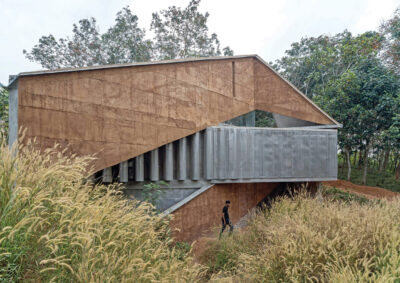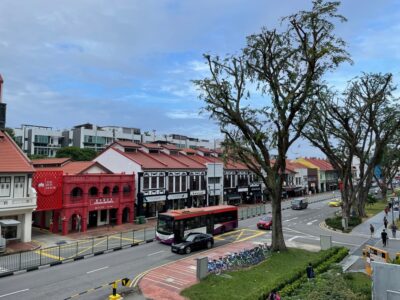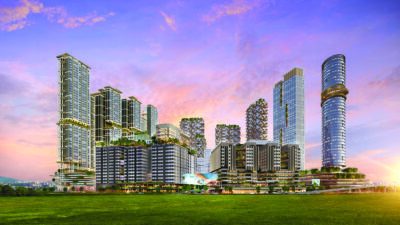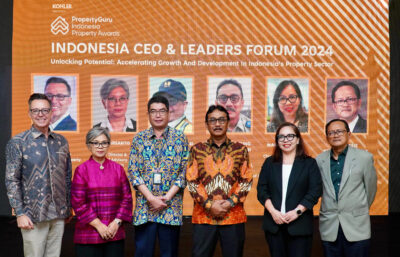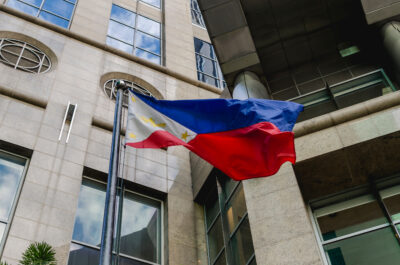Property for the people
With the pandemic putting a spotlight on corporate practice like never before, players in the real estate industry around Asia are getting serious about investing in ESG

Like many images captured during the pandemic, it could easily have been a scene from a Hollywood apocalypse movie. In the heart of Bangkok, military police clad in fatigues, face masks, and full-length visors guarded the shuttered corrugated metal entrance to a construction workers’ camp. Above them, the sign read: “No entry or exit until further notice.”
The camp was one of a wave of sites sealed off by Thai authorities in June 2021 to curb the spread of Covid-19. Overnight, some 81,000 workers were imprisoned, stranded from the outside world. In 2019, there were more than three million registered migrant workers in the country, mostly from neighbouring Laos, Cambodia, and Myanmar. While as many as 500,000 returned to their home countries at the start of the pandemic, those who remained did not have the right to healthcare or other forms of social safety. Many were—and still are—completely undocumented.
The pandemic demonstrated the importance of sustainability and a realisation that the way we have been doing business so far, in terms of profit before everything else, simply cannot continue. It’s literally unsustainable
As the initial 30-day quarantine progressed, local media reported that government promises to provide food, water, and basic supplies; cover 50 percent of salaries; and set up testing sites had fallen short. Workers were left to fend for themselves in crowded and unhygienic close quarters, reliant on charities and donations to survive.
Thai netizens were quick to criticise the government. But the developers and construction companies behind the glitzy high-rises to which workers dedicated their waking hours were also in the firing line for their perceived inactivity. It was a rude awakening for a sector that has invested heavily in marketing corporate social responsibility (CSR) initiatives— and latterly environmental, social, and governance (ESG) schemes.
“I think for the general public the pandemic demonstrated the importance of sustainability and a realisation that the way we have been doing business so far, in terms of profit before everything else, simply cannot continue,” says James Eckford, technical advisor at Baan Dek Foundation, which works with construction companies and developers to help improve worker camp environments in Thailand. “It’s literally unsustainable.”
The term ESG was first popularly used in a 2004 report titled “Who Cares Wins”, a joint initiative of financial institutions at the invitation of the United Nations. Almost two decades later, the ESG movement has grown from a corporate social responsibility initiative into a global phenomenon representing more than USD30 trillion in assets under management. In 2019 alone, capital totalling USD17.67 billion flowed into ESG-linked products, an almost 525 percent increase from 2015, according to US financial services firm Morningstar.

Its rapid growth builds on the Socially Responsible Investment (SRI) movement that has been around much longer. But unlike SRI, which is based on ethical and moral criteria and uses mostly negative screens, such as not investing in alcohol, tobacco, or firearms, ESG investing assumes that these factors have financial relevance. It is now, quite literally, big business. But what explains the rise of ESG and what does it mean for the future of real estate?
“There are a few factors leading to this phenomenon,” explains David Fogarty, head of sustainability & ESG consulting services for Southeast Asia at CBRE. “The policy drivers, mandates, and financial incentives from the government and investors motivate and catalyse the implementation of ESG strategies.
“We have also observed that pioneering listed companies are willing to set ESG targets and monitor the implementation through data support. The main benefits are supporting their CSR strategy, corporate branding, and financial incentives such as ESG loans and bonds.”
For many, ESG suggests environmental issues such as climate change and resource scarcity. While these are important elements, the term covers much more, including social issues, labour practices, talent management, product safety, or data security, as well as governance matters like diversity, executive pay, tax management, and business ethics.
Since launching more than a decade ago, Baan Dek Foundation has been revolutionising the way social issues are addressed in Thailand’s real estate sector. Crucially it has worked with innovative construction firms, developers, and humanitarian aid agencies including MQDC, Syntec Construction, and UNICEF Thailand to develop solutions and practical tools to improve communities’ conditions and access to services.
“The social aspect is huge and opaque, and many companies see it as a free-for-all or a pick-and-mix of topics that they think are easy to tackle,” Eckford says. “Good practices emerging are supplier codes of conduct, but the challenge is controlling this and ensuring that there is no social washing happening. This is where civil society and human rights experts can support, not only to ensure that risks are properly identified and vulnerable stakeholders are engaged, but that appropriate mechanisms are in place to ensure accountability.

Baan Dek Foundation’s experience and the revelations of the pandemic led to the creation in 2021 of the Building Social Impact (BSI) Initiative. The private-sector driven sustainable social impact initiative for migrant workers and their families features the BSI Framework for Action, a set of 12 actionable recommendations for construction companies. These recommendations aim to improve the living conditions in construction site camps, as well as workers’ and children’s access to essential public services, such as healthcare, education, and social services. It also includes a training toolkit to guide companies from the operational to the management level.
In less than a year, five major construction companies have already signed on with two large property developers poised to join—in addition to almost 30 smaller-scale firms in Chiang Mai. One of the BSI partners, Magnolia Quality Development (MQDC), is already renowned for its sustainability performance, and recently unveiled the dedicated knowledge-sharing platform Research and Innovation for Sustainability Centre. Other Thai real estate companies with a history of undertaking positive social sustainability initiatives focused on worker and family wellbeing include Areeya Property, SC Asset, and Pruksa, according to Baan Dek Foundation’s research.
Elsewhere in Asia, Malaysian developer Matrix Concepts Holdings Berhad was recently recognised at the PropertyGuru Asia Property Awards for its ESG efforts. In its 2021 sustainability report, Sustainability Committee chairman Dato’ Haji Mohamad Haslah Bin Mohamad Amin said: “Covid-19 is an excellent example of how poor ESG controls and oversight ultimately resulted in a global pandemic. If anything, the virus outbreak serves as a stark reminder of even more severe consequences should the world continue to relegate sustainability to an afterthought.”
Far from an afterthought, Matrix has placed ESG at the heart of its business in recent years. Major achievements to date include the adoption of the UN’s Sustainable Development Goals, formalising whistleblowing and health and safety policies, as well as the introduction of group-wide sustainability, anti-bribery and corruption policies. With its dedicated committee directly overseen by the board and annual whitepapers, the developer is also trailblazing the governance aspect of ESG in the country’s real estate industry.
“A company with good ESG strategy shall take all the material ESG issues that are important to internal and external stakeholders into account, not only the ‘E’,” says Jackie Cheung, associate director for ESG at Knight Frank Hong Kong. “Governance is the foundation and cornerstone of ESG, which investigates boardroom practice and behaviour. Governance has the most significant contribution to a firm’s performance out of multiple ESG benchmarks.”

Guocoland is another example of a real estate firm taking major steps to ensure governance is at the heart of its ESG initiatives. Over the years, it has demonstrated its adherence through various accolades. These include the Building and Construction Authority Green Mark Champion award, recognising developers with a strong commitment towards corporate and social responsibility, as well as developing Green Mark buildings at the gold level or higher. The Singapore-based developer is also aligned with comparable reporting frameworks, such as the Task Force on ClimateRelated Financial Disclosures and Global Reporting Initiative standards.
Established industry players such as Guocoland and Matrix may already be embracing internationally recognised standards for ESG, but many are still too reliant on internal reporting, according to Trey Archer, business development director, Asia, for GRESB, which provides validated ESG performance data to financial markets.
“This is a huge mistake. Yes, it’s good to have these documents, but there is no standardisation from one company to the next,” he says. “They only usually highlight the good areas where companies excel, and there’s no benchmarking. Therefore, GRESB is a powerful tool. It’s a standardised report that all companies follow, revealing both the good and bad, so they can benchmark against industry peers.”
Still, the tide appears to be gradually turning, especially in the aftermath of the pandemic. Developers and construction firms in the region are increasingly adhering to internationally recognised frameworks. Investors, meanwhile, are gaining a greater understanding of supply chains and ever-improving access to ESG assessment criteria and reporting. Yet the next—and arguably most significant—step in embedding ESG into the real estate industry needs to come from the public sector.
“Governments cannot be afraid of appearing as though they are creating more red tape for companies,” Eckford says. “Voluntary measures have long been shown to be ineffective.
“Hard regulation is an absolute must. But this must be combined with support and collaboration as well as punitive measures for lack of action.”
This article was originally published on asiarealestatesummit.com. Write to our editors at [email protected].
Recommended
Meet the vagabond architect behind India’s housing scene
Vinu Daniel is helping to shake up India’s home building setting
Where Asian real estate stands in a fragmented, warmer world
Asia’s real estate industry faces many and varied challenges as external factors continue to bite
6 sights to see in Singapore’s Marine Parade
Handily located Marine Parade has emerged as a vibrant investment choice in the Lion City
There’s a township dedicated to health and wellness in Malaysia
Property seekers have their health needs catered for at KL Wellness City

